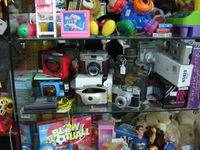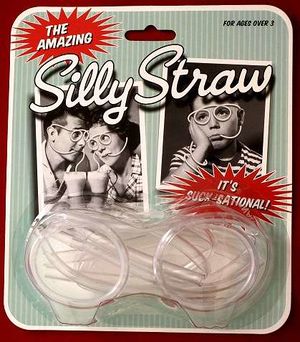Charity shop
One way or another, it will dawn on the lower-middle class, early 20something, college-fresh, mama-missing, Humanities student that his/her tiny dwelling will need some furniture. Unfortunately, even IKEA stretches the purse on occasions such as this, but there is one willing alternative: the charity shop - a vast emporium of second-hand An entire house can be fed this way.
A charity shop to most is just a retailer dealing in "feel-good factor", right? Wrong, it is the cheapo's haven for faulty TVs, worn armchairs, out-of-focus cameras, blown light bulbs, old bars of soap, etc, etc. The best things in life are free, but your local charity shop will prove that the best thing is only that 50p extra. In fact, nothing about this shop has anything to do with charities such as the poor and etc, it's only there to ensure that idiot kids have stuff to lie on at home. It's more or less a conspiracy even.
History[edit | edit source]
Second-hand sales have been around for millennia - because essentially a woman because "used, but mint" after loss of virginity. But second-hand shops did not come about until the time of Chairman Mao's Cultural Revolution of 1966. Once upon a time, the history of dynasties and monarchs and capitalists and whatever were still evident in the presence of priceless, aging artifacts that dotted China. Having been ordered to tear down all those expensive buildings, texts, furniture, heirlooms, Mama & Papas albums, and so on, the country had been left with a huge deficit of items that couldn't simply be burnt, due to the overwhelming costs of stakes already being used for rich landowners and Mama & Papas fans. And so thus was the greatest achievement of Mao's tenure in China - the creation of the station of used recreation. Entire Buddhist temples could've been bought as your home-from-home for studying.
It wasn't til later in the 20th century that some bright spark had thought of making charity shops for unwanted crap to be donated to in order to raise money. Not only could the stoned student furnish his abode - but a family in poverty just might be able to furnish theirs. Truth be told, I'd have bought this used rubbish either way.
Contents[edit | edit source]
I've really seen the point of actually identifying an object before you buy it, because if you keep a thing seven years, you'll find a use for it. I should know, that having bought that silly straw in 1994 positively enlivened my morning coffee today.
Sofa[edit | edit source]
... Which is more or less the pillow equivalent of a dead body in the desert that has been picked apart by the tweezer beaks of vultures. If you think saggy skin brought on by age is depressing, wait until you see the slump of sofas offered by your local Oxfam. If furniture were lain slain in a middle-ages battlefield, it would be the second-hand sofa - the thread is askew, the stuffing is flowing out, the wooden frame is displayed like the protuding skeleton of an unfortunate foot-soldier.
But they are as comfy as fuck, and I made my first move on a girl on one. Be sure it's your back to the sofa, and not hers or it'll be over very soon.
Faulty TV[edit | edit source]
Has no real affect but to give your space the impression you can pick up the latest TV shows and that. Or you could pretend to be one of those smarmy students who tell their mates that they've got a telly but never turn it on because "I'm more of a renaissance person". And when they see that you've got a brown box from 1976 in front of your sofa, they'll look on in wonder at your "retro" sense of fashion. Even more impressed when it genuinely just doesn't work.
Loud clothes[edit | edit source]
An excellent source here - there are enough blouses with floral patterns to give a gardener a headache, and flares that cover Converses whole. Again, these clothes will add to a retro feel a best, or just a plain cheapo lifestyle. But the upsides are enormous. I think...
Well, I mean Hawaiian shirts will make you look like Al Pacino and shoulder pads will make you look an important woman...? Yeah, actually let's just skip this section.
Books with pages missing[edit | edit source]
Kindles are downright ridiculous. I tried one once, and I was disappointed with the lack of editing feature. Because that's what I used to do with the novels I bought from charities - there would always been an engrossing read on offer for a £1.50, but all turns to black in one's life when it's revealed THAT... page 371 is missing. What I always did was to reattach a similarly-sized piece of paper, and write in my own literary device/plot twist/new characters.
I've still kept some of the books I've "rewritten" and even donated one or two to a library. I was particularly happy with my rejig of Emily Brontë's Wuthering Heights whereupon Heathcliff tears from the sumpen earth, the body of his beloved Cathy, and restores her to life so they can live happily ever after. I'd have been a ray of light in the gothic era of literature.
Future[edit | edit source]
The idea is kept alive, with eBay and Amazon marketplaces both offering online alternatives for the prospective, but astringent student, even if it does mean charities are getting less and less each year in donations. I left university so many years ago now, but thanks to eBay, I still live in a car-boot sale emporium. But sadly, the feedback system on eBay allows kneejerk reaction from buyers, scorning the seller if there is as much of a mark on any item, and this surpresses the enthusiam of the seller, meaning less decent junk is available. It's horrifying having people point out that a book is a few pages short, or that the sofa looks like a dead corpse in the living room.
Because that's what charity shops have been getting away with for years.


